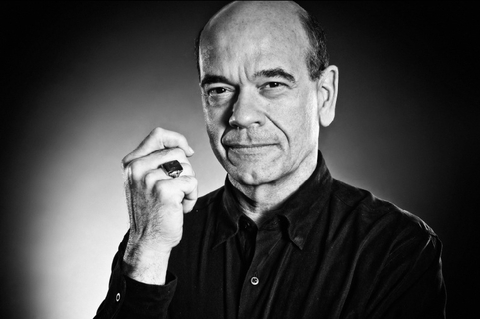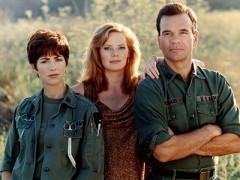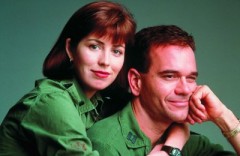The Light from the TV Shows: A Chat with Robert Picardo (“China Beach”)
Some know Robert Picardo for the time he spent playing the Emergency Medical Hologram on “Star Trek: Voyager,” while others remember him more fondly for his work as Coach Cutlip on “The Wonder Years,” but at the moment, the TV show on his resume that more people are talking about than any other is “China Beach,” which is – after way, way too long a wait – finally on DVD. Picardo took a few minutes to chat with Bullz-Eye about the release of “China Beach: The Complete Series,” his reminiscences of working on the series, and if viewers are wrong to see a touch of his Dr. Dick Richard turning up in the aforementioned EMH.

Bullz-Eye: From what I understand, it sounds like we’re both on the same page as far as being unable to refresh our memories on “China Beach”: they tell me my copy of the complete-series set is due to arrive tomorrow.
Robert Picardo: Oh, good for you! But I did already get mine. [Laughs.] They got it to me yesterday, and I devoted some time to it. I watched a couple of the bonus features. There are 10 hours of bonus features, and I guess I watched about two hours of them, or thereabouts. And then, even though I had to get up very early this morning to do these interviews, I thought, “Well, I’ll pop in the pilot and just watch the first five minutes to see the quality of the transfer.” And, of course, I watched the entire pilot. I couldn’t turn it off! So that was a good thing. The fact that I was so captivated was a good sign.

I’m really happy to see that the show, which was a period piece to begin with…I mean, we made it in the late ‘80s and early ‘90s, but it was set from ’68 to ’71, principally, and then the last season we kind of skipped into the future as late as 1987. But basically it was a period piece to begin with, so in that respect it hasn’t aged. It’s still a great time capsule and doesn’t feel dated, and I’m so proud of the work in it. Dana is extraordinary, Marg Helgenberger is extraordinary, but the whole ensemble is just great. You know, it was a very special time in my career, and I know and I’ve heard Dana and Marg and pretty much all of the actors say the same, so to have it reach a new audience is really very gratifying and exciting.
BE: What do you remember about your first read of the pilot script?
RP: I remember reading it and thinking it was great. And important. It felt like an honor to be part of something like that, which was really about something, I mean, obviously, you’d…I guess you’d say the success of the movie “Platoon” led to the possibility of major television networks doing Vietnam dramas. And, of course, “Tour of Duty,” our sister show… [Laughs.] Well, that was really more about “Platoon” and about the soldiers fighting. What was unique and special about “China Beach” was that the point-of-view character was a woman, an Army nurse who served there. So it gave the show a special perspective. It wasn’t about combat, it was about saving lives. It was about supporting and helping soldiers. The war was like an offstage character.

We were the support group there—the nurses, the doctors, the USO people—to sort of support and patch the guys up and either send them back or, if they were too injured, send them home. And more often than not, if they were dead, you’d offer the last gesture of respect to them. That’s what Michael Boatman’s character did, the guy who ran the grave registration. What a terrific role, and an extraordinary performance for a 24-year-old guy. I mean, to have so much…what’s the word? He created such a character who had seen everything, and he was totally believable as a guy who…that was his life, just all of that death and loss. And what that had turned him into was sort of a 24-year-old old man. Anyway, it’s just great writing. William Broyles, who served in Vietnam and who co-created the series, said that he feels it’s the best war drama that’s ever been on television. And, well, yeah, you could say that he’s a little partial, since he co-created it. [Laughs.] But you know what? I agree with him.
You can follow us on Twitter and Facebook for content updates. Also, sign up for our email list for weekly updates and check us out on Google+ as well.
Posted in: Entertainment, Interviews, News, Television
Tags: Aretha Franklin, B.J. Hunnicutt, Ben E. King, China Beach, China Beach: The Complete Series, Chloe Webb, Coach Cutlip, Dana Delaney, Dr. Dick Richard, Emergency Medical Hologam, EMH, Hawkeye Pierce, Janis Joplin, John Wells, M*A*S*H, mad men, Marg Helgenberger, Michael Boatman, Platoon, Robert Picardo, Sensored, Star Trek, Star Trek: Voyager, The Four Tops, The Light from the TV Shows, the Supremes, the Temptations, The Wonder Years, Time-Life, Tour of Duty, Van Morrison, Will Harris, William Broyles

 Say what you will about me, I am a man of peace. That is why I come to you, this St. Patrick’s Day eve, with a small suggestion. If you should, for some reason, find yourself at an actual Irish bar or pub tomorrow night, please resist the urge to order two drinks, which I will now name.
Say what you will about me, I am a man of peace. That is why I come to you, this St. Patrick’s Day eve, with a small suggestion. If you should, for some reason, find yourself at an actual Irish bar or pub tomorrow night, please resist the urge to order two drinks, which I will now name.








